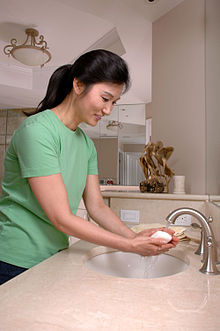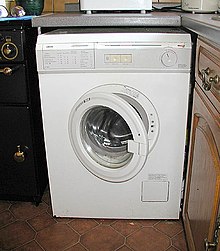Washing

Washing is a method of cleaning, usually with water and often some kind of soap or detergent. Washing and then rinsing both body and clothing is an essential part of good hygiene and health. [citation needed]
Often people use soaps and detergents to assist in the emulsification of oils and dirt particles so they can be washed away. The soap can be applied directly, or with the aid of a washcloth.
People wash themselves, or bathe periodically, often using a shower or a bathtub. Infants, the sick, and people with disabilities are bathed by a caregiver, but those that can wash themselves often do so. People bathe naked under most circumstances and commonly do so in the privacy of their homes. Bathing may also be practiced for religious ritual or therapeutic purposes[1] or as a recreational activity.
In Europe, some people use a bidet to wash their external genitalia and the anal region after using the toilet, in addition to using toilet paper.[2] The bidet is common in predominantly Catholic countries where water is considered essential for anal cleansing.[3]
More frequent is washing of just the hands, e.g. before and after preparing food and eating, after using the toilet, after handling something dirty, etc. Hand washing is important in reducing the spread of germs.[4][5][6] Also common is washing the face, which is done after waking up, or to keep oneself cool during the day. Brushing one's teeth is also essential for hygiene and is a part of washing.
'Washing' can also refer to the washing of clothing or other cloth items, like bed sheets, whether by hand or with a washing machine. It can also refer to washing one's car, by lathering the exterior with car soap, then rinsing it off with a hose, or washing cookware.

Excessive washing may damage the hair or cause rough skin or skin lesions.[7][8]
See also
- Bathing
- Car wash
- Cleaning agent
- Cleanliness
- Hygiene
- Hygiene in Christianity
- Dishwashing
- Hand washing
- Laundry symbols, washing machine
- Sanitation
- Wikibooks:Car Washing Techniques
- ingredients
References
- ^ Shove, Elizabeth (2004). Comfort, Cleanliness and Convenience The Social Organization of Normality (New Technologies/New Cultures). New York: Berg. ISBN 978-1-85973-630-2.
- ^ "Eco-Friendly Cleaning Cloth and Toilet Papers". SimplyNatural. 2020-06-18. Retrieved 2020-07-01.
- ^ E. Clark, Mary (2006). Contemporary Biology: Concepts and Implications. University of Michigan Press. p. 613. ISBN 9780721625973.
Douching is commonly practiced in Catholic countries. The bidet ... is still commonly found in France and other Catholic countries.
- ^ CDC: Why Wash Your Hands?
- ^ Clean Hands, Thomas Osborne, M.D.
- ^ HealthReach CHC
- ^ You Probably Wash Your Hair Way Too Much retrieved 6 October 2012
- ^ Infections in Obstetrics and Gynecology: Textbook and Atlas retrieved 6 October 2012, Eiko Petersen - pages 6-13
